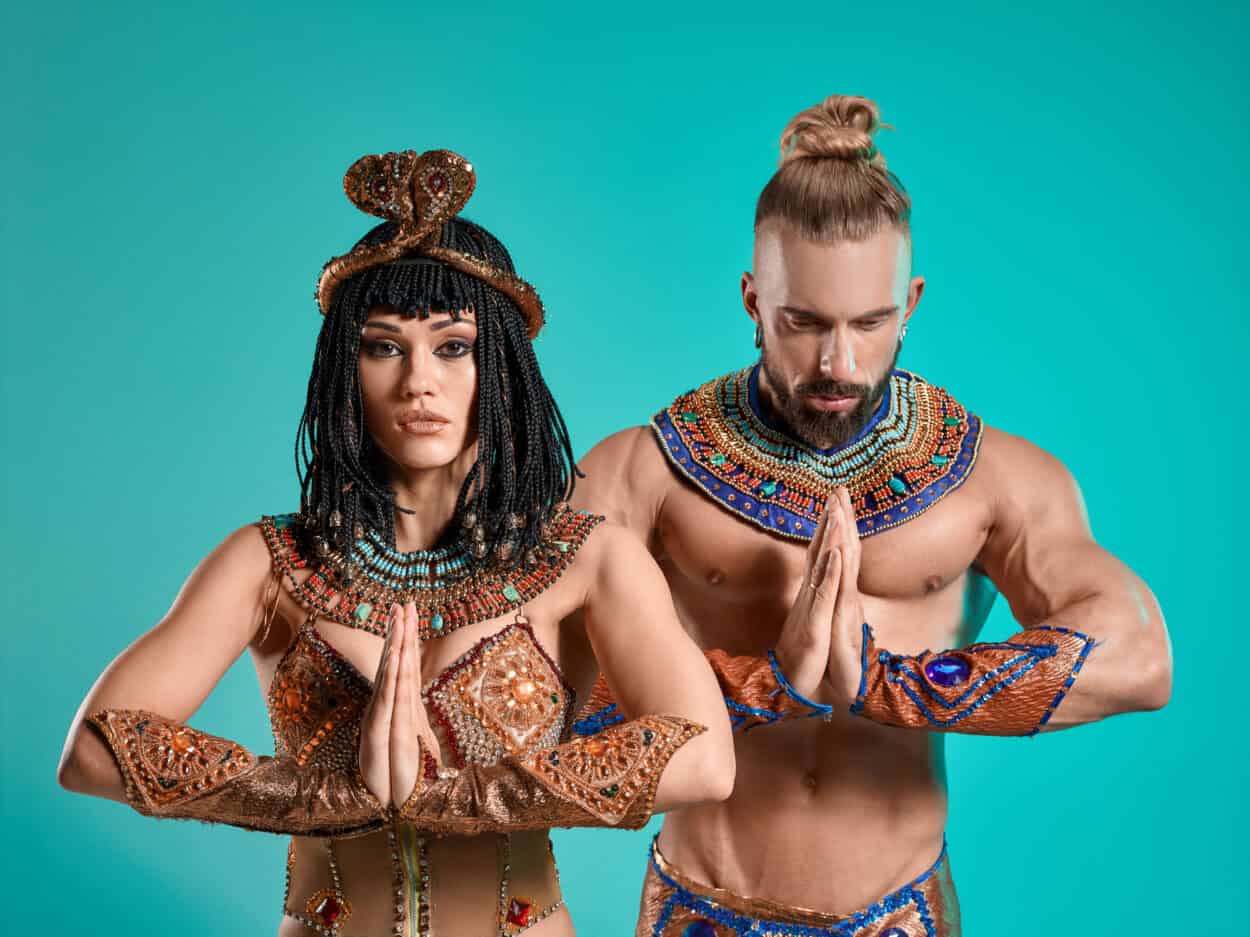If there’s one thing we all can agree on, it’s that weddings have a universal magic of their own. Each ceremony, steeped richly in age-old traditions, tells a unique tale of love woven elegantly against the backdrop of culture.
Now imagine a land where mighty pyramids stand silhouetted under the star-spangled desert night, where the Nile whispers thousand-year-old secrets. Yes! We’re traveling on the wings of ancient papyrus scrolls into a country nestled along the northeast corner of Africa – Egypt!
Prepare to dive into a spectacular odyssey tracing Egyptian wedding traditions, as timeless and fascinating as the enigmatic sphinx itself.
From engagement contracts etched with powerful symbolism to stunning jewelry that weaves tales of commitment, Egyptian wedding traditions are teeming with intriguing ins and outs.
As each layer unfolds, you’ll find yourself in love with these traditions – classic yet dynamic, charming yet profound – secretly embedding themselves within your wedding planner heart. Ready for this thrilling excursion? Let’s go unmask those secrets!
The Historical Origin of Egyptian Wedding Traditions
Hold on to your veils, darling readers, we’re heading straight to the heart of Egyptian times! The enchanting passage of time has bestowed upon us a plethora of captivating wedding traditions which have blended old and new elements in harmonious union. Sounds intriguing, doesn’t it? Let’s dive deeper!
The big picture: Egypt isn’t all about one type of wedding tradition. In fact, there’s a stunning bouquet of traditions here that vary significantly, just like the hues of a desert sunset.
Why so much variety you ask? Well, a lot depends on whether you’re looking at Muslim or Coptic Christian practices. Yes, beliefs do shape traditions remarkably.
Now get this: approximately 91% Egyptians identify with Muslim beliefs and the remaining 9% align themselves with Coptic Christianity. Yep, same country, but different outlooks make weddings in Egypt a fantastic landscape of diversity!
Both religious communities follow distinct rituals that beautifully echo their cultural lineage. Yet fundamentally, they all share the same core: love and commitment.
So next time you blindly pin a seemingly odd ‘Egyptian-inspired’ idea onto your ‘World Wedding Inspirations’ board, take a brisk walk through its roots. You never know how many more ideas may spring forth from understanding these ancient practices!
TL;DR: Egyptian weddings blend diverse traditions owing to Muslim and Coptic Christian beliefs. Always delve into the historical origin before integrating any special ‘Egyptian-inspired’ element— knowledge enhances execution!
The Symbolism of Engagement Contracts in Egyptian Weddings
Who would’ve thought ink on paper could carry such profound meaning? Welcome to the remarkable world of Egyptian engagement contracts – Je Peniot!
However, before you slide on your reading glasses, know this: these aren’t bonds forged in iron chains. Here’s a catchy little factoid for you – they’re not sacraments and can indeed be dissolved. Talk about an interesting twist!
Let’s peel back the curtain a tad further, shall we? Je Peniot involves much more than just signing off names. It’s a stage drama featuring grand public declarations and formal tête-à-têtes that add a unique flavor to the engagement process.
The protagonists here are Mahr (dowry) and Shabka (objects made from gold and precious gems). Ah, sweet mysteries of love!
So, when you’re sitting at your desk, sipping coffee and drafting up wedding plans, pause for a moment. Think of this rich tapestry of love agreements painted with gold and precious gems.
Consider adding this dash of solemnity and celebration into your own ceremony – it’s authentic, it’s unique! Just remember, always honor the essence it stems from.
TL;DR: Egyptian engagement contracts (Je Peniot) are exciting mixtures of symbolism and celebration. Not sacrosanct, they add depth to ceremonies without being binding.
The Essential Role of Jewelry during Egyptian Weddings
Ever wondered about the secret whispers between gold and gemstones at an Egyptian wedding? Hello, meet Shabka – the radiant heartthrob of Egyptian wedding traditions!
This glittering eye-candy isn’t here just to flirt with your aesthetics but shoulders a significant role in weddings. Get ready to be dazzled!
Here’s the glitz and the gold: Shabka is a special gift from the groom to the bride. Remember, it’s more than just a shiny object; it’s a token of commitment drenched in priceless love.
Often composed of gold and other precious gems, these become quintessential visuals of any Egyptian wedding story.
And here’s my favorite part – the engagement ring, initially slipped onto brides’ right hand migrates over to the left during the wedding.
Ah, voila! Herein lies a beautiful symbolism—it marks the journey from being engaged to being pledged in marital bond. So, bring out those shiny bands and paint them with unique nuances!
TL;DR: Shabka, or jewelry gifted by groom to bride plays an essential role in Egyptian weddings. Remember that for Egyptians, rings symbolize more than beauty; they mark a journey from engagement to wedded bliss! Now isn’t that a shiny piece for thought?
Mystique of Pre-Wedding Rituals: The Henna Night
Fasten your seat belts, ladies and gents—we’re about to embark on a journey through time to an enchanting world called Laylat Al-Hinna.
Ever heard of it? That’s right, this world brings to life the mesmerizing henna night celebration, a traditional pre-wedding ritual flowing through the veins of Egyptian society. Intrigued yet? Hang tight, we’re diving in!
Laylat Al-Hinna—quite the mouthful, isn’t it? But it’s just as full of beauty and meaning. A moonlit soiree by design, this age-old tradition centers on painting intricate henna tattoos onto the bride’s hands and feet.
And it’s not just about aesthetic charm. Believe it or not, this body art extravaganza is believed to usher in good fortune for the soon-to-be-married couple!
So how can we add this splash of culture onto our palette without dousing ourselves in superficial fanfare? Maybe opt for elements of these rituals tinged with modern tweaks. Incorporate henna designs into your invites or bridal shower cake design—somewhere that compliments your wedding theme.
TL;DR: The Henna Night (Laylat al-Hinna) unravels a world of intriguing pre-wedding rituals in Egypt. They enjoy more than decorative appeal; they bring good fortune!
Decoding the Dress Code in Egyptian Wedding Ceremonies
If there’s one thing I’ve learned from exploring weddings worldwide, it’s that the dress code can be as unique and intriguing as the traditions they stem from. Egypt? She is no exception! Let’s dance through the riot of colors draped onto Egyptian brides and grooms!
Egyptian wedding attires are magical love stories spun into threads. And while the silhouette may vary from traditional to modern, veils almost always grace a bride’s ensemble—the symbol of modesty wrapped in sheer elegance!
Play around with veil designs without losing their profound symbolism—the possibilities are endless!
And hold on, the scene isn’t all bridal; let’s take a moment for our dapper grooms too. They get to choose between charmingly tailored suits, classy tuxedos to traditional attire. Talk about a grand style workout!
From this kaleidoscope of choices, pluck what sings to your heart and cues your personality as a couple.
TL;DR: Egyptian wedding attire is diverse yet highly symbolic for both brides and grooms. Embrace this rich narrative when choosing a dress code for your ceremony—you’ll create memories sewn seamlessly into your love fabric!
Unpacking the Egyptian Wedding Ceremony Rituals
So we’ve gushed over dresses and savored pre-wedding rituals, how about we blow some love bubbles onto one of the most mesmerizing choreographies of love—Egyptian wedding ceremonies!
Brimmed with enchanting hymns, bracelets of prayers, and dazzling exchanges of rings, these affairs are mini time machines to rich tapestries of tradition.
At these ceremonies, a religious figure gracefully takes the baton to lead the show. Can you hear the divine prayers serenading the room? Ah, that’s the bishop or priest serenading your matrimonial harmony!
And there’s more sparkles to this fairy-tale—a joyous anointing with holy oil, a beautiful blessing of crowns. Adding these symbolic rituals to your ceremony can bride together tradition and individual touches – just remember to keep the essence intact for that authentic vibe!
Merge these timeless practices into your ceremony, perhaps in exchange vows, breaking glamorous glass traditions or during ring ceremonies. After all, isn’t blending tradition and personality what makes weddings unforgettable?
TL;DR: Egyptian wedding ceremonies offer a mesmerizing tapestry of rituals—led by religious figure, include hymns, prayers, ring exchanges and blessings. Don’t shy away from adopting elements that resonate with you.
The Grandeur of Egyptian Wedding Procession: The Zaffa
Who’s ready to take a high-spirited dip into the pulsating heart of an Egyptian wedding tradition called Zaffa? Perfect, because we’re about to uncover an outpouring of energy as intoxicating as bubbling champagne!
No offense to your regular, quiet wedding processions, but Zaffa is one lively wedding march that’ll sweep you onto an exhilarating ride. Bursting with music and dance, it’s less of a walk and more of a rhythmic extravaganza.
Picture high voltage music, entrancing dancing, and celebratory zaghareet (ululations). It’s certainly not your average walk down the aisle!
Oh, and get this: the bride often makes her grand entrance on a camel. Now, that’s making an entrance in style! A quirky touch like this might just add the kick you’ve been looking for—depending on your venue’s regulations on wildlife, though!
TL;DR: The Zaffa transforms a traditional wedding procession into a spirited celebration full of music and dance. Just remember to confirm if you can bring camels before sending out invites!
Harmony of Melodies: Role of Music in Egyptian Weddings
Let’s trot alongside the symphony orchestra that plays the vibrant love song of an Egyptian wedding, shall we? Spoiler alert: it’s strikingly upbeat and creates a melody that haunts your soul long after.
Music in an Egyptian wedding isn’t just about providing background score; it’s intended to reach right to your heart. Prancing around this rhythmic maze are the newlyweds showcasing their fancy footwork.
Now just imagine—your first choreographed dance amidst a wave of infectious drumming, strings, and mesmerizing ethnic tunes—can you feel the energy sparking off?
The moment may seem grand, but what’s beautiful is that anyone can infuse this melody into their ceremony! So, if moving with the rhythm defines you two as a couple, don’t shy away from collaborating professional dance choreography into your fairytale moment!
TL;DR: Music in Egyptian weddings embodies tradition and celebrates newlyweds with captivating choreography. Adding rhythm to your ceremony can amp up the fun and embody a piece of spectacular Egyptian tradition!
The Exquisite Feast: Post-Wedding Celebrations in Egypt
Ready to feast your senses on an Egyptian culinary extravaganza? Awesome—let’s waltz to the rhythm of non-stop dancing, clinking glasses, and sumptuous delights that make up Egyptian post-wedding celebrations!
Think of post-wedding Egyptian feasts as elaborate, noisy, love-filled tableaus that make you want to hit the dance floor.
The bride and groom seated regally on a “kosha”—a raised, decorated throne-like structure—watch as guests sink into a whirlpool of fun and frolic. Excited to paint this scene onto your canvas?
One way is through the refreshing sweet drink Sharbat. A hero in most Egyptian weddings, this thirst-quencher symbolizes shared prosperity.
Pour some of these delightful flavors into your celebration through signature bottled drinks or dedicated Sharbat bar—the cheers will stretch into eternity!
TL;DR: Post-wedding feasts in Egypt are a riot of laughter and dance, paired with symbolic foods like Sharbat. Add a dash of this zest to your celebration with themed bars or unique menu items.
The Nuqtah: The Custom of Gifting in Egyptian Weddings
Ever wondered what Egyptians shower newlyweds with aside from lots of good wishes? Let’s immerse ourselves into a delightful mix of prosperity and fertility, coined with a term – the Nuqtah.
The custom involves raining grains on the couple as they exit—quite a dazzling storm of fortune, right? But that’s not the end of the gifting charm.
Gifts also include envelopes filled with money—exchanged discreetly, and given specifically to the bride following the Nuqtah. Fancy incorporating an Egyptian spin on your ribbon dance or confetti toss? Here’s your inspiration!
Remember, it’s not about exact replication but embedding nuances from practices that fascinate you. Toss lavender buds instead of rice for some eco-friendliness or distribute personalized thank-you notes filigreed with Egyptian art—detailing counts!
TL;DR: In Egyptian weddings, gifting takes center stage in Nuqtah—with showers of grains symbolizing prosperity and fertility even extending to monetary gifts.
Frequently Asked Questions
1. What’s the significance of jewelry in Egyptian weddings? Jewelry, particularly Shabka, is a significant component of Egyptian wedding traditions. The groom usually presents the bride with these pieces, often made of gold and precious gems. Not just for embellishing, these represent the groom’s promise to care for his future wife.
2. What does an Egyptian wedding dress look like? Diversity sparkles in every thread of Egyptian wedding attire. Brides often wear veils, symbolizing modesty, and their ensembles range from traditional to modern dresses infused with rich cultural touches.
3. What is a typical Egyptian wedding ceremony like? Expect to witness a rollercoaster of emotions painted with hymns, prayers, ring exchanges, anointing with holy oil, and blessings—usually led by a bishop or priest. The visual spectacle reaches its crescendo eclipsed by vibrant wedding processions known as Zaffa.
4. What role does music play during an Egyptian wedding? Music paves the way for harmonious celebrations at an Egyptian wedding. From setting the rhythm to beating drums during processions and power-charged dance routines by newlyweds—it engages guests and encapsulates unforgettable moments!
5. How are post-wedding celebrations conducted in Egypt? Feasts! Elaborate feasts are central to post-wedding celebrations in Egypt. Packed with elements like Sharbat—a traditional sweet drink symbolizing shared prosperity—to ongoing dances around a lavishly decorated bride and groom seated on a kosha.
6. What unique gifting tradition is followed in Egyptian weddings? The fascinating ‘Nuqtah’ practice where guests shower grains on exiting newlyweds, symbolizing prosperity and fertility is distinctive in Egyptian weddings. Often envelopes filled with cash gifts discreetly given to brides also form a part of the Nuqtah tradition.
Remember, cultural traditions provide a wealth of inspiration to weave into your celebrations—no matter where you hail from. So mix, match and create an unforgettable fusion!
Wrapping Up
And that’s a wrap, lovely ones! We’ve danced through the colorful bazaars of Egyptian wedding traditions, twirled around enchanting engagement contracts, reveled in jewelry’s radiant roles, and feasted on post-wedding celebrations brimming with delicious symbolism.
Remember, choosing to paint your wedding with international hues isn’t about exhausting tradition—it’s about echoing glimpses of what you loved in a way shimmering authenticity. So mix, match, and create an unforgettable fusion—one that weaves your true colors into every wedding ritual you choose to embody. Onward to love and wedded bliss worldwide!
- Delightful Greek Wedding Traditions: A Deep Dive Into Cultural Heritage - September 25, 2023
- No Friends to be Your Bridesmaids? Here’s What You Should Do - September 24, 2023
- Egyptian Wedding Traditions: Unveiling the Mysteries of the Age-old Traditions - September 19, 2023




Leave a Comment